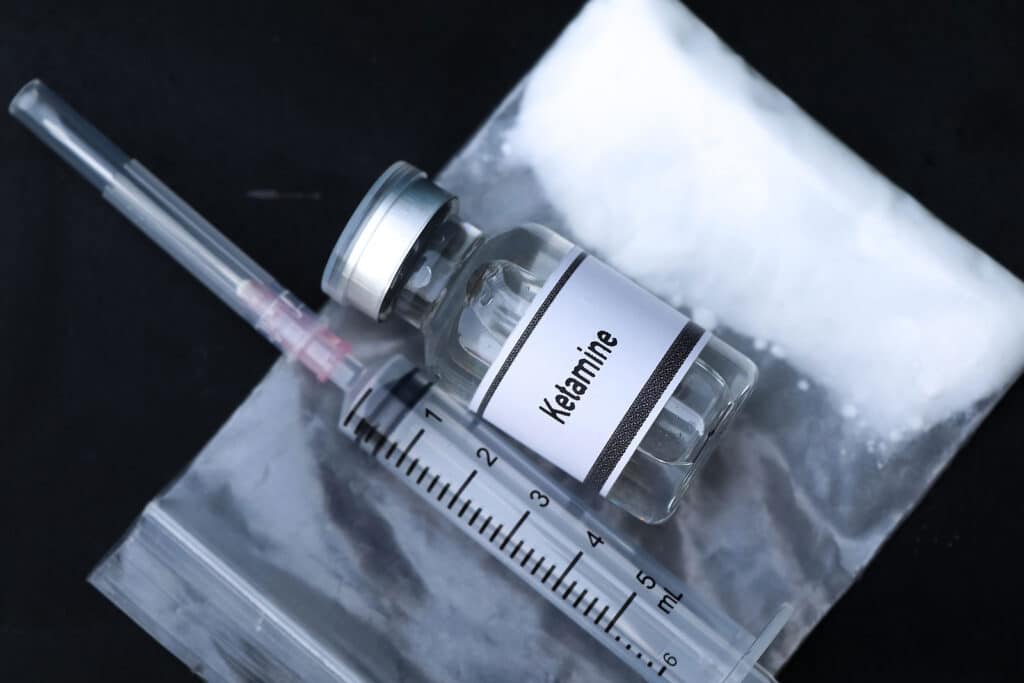Ketamine, a short-acting dissociative drug, is commonly used in ketamine administration for anesthesia in humans and animals. At higher doses, ketamine can cause visual and auditory distortions, hallucinations, and a sense of detachment from reality. Users may feel disconnected from their environment or lack control over their bodies. Its sedative properties can calm, relax, and immobilize users, often leading to amnesia after the effects wear off. Additionally, ketamine provides effective pain relief.
In recent years, the use of ketamine in medical settings has expanded to include ketamine infusions for conditions like treatment-resistant depression and post-traumatic stress disorder (PTSD). These controlled treatments leverage ketamine’s unique dissociative properties under professional supervision to address severe mental health challenges.
Outside medical contexts, ketamine’s dissociative effects have made it a popular street and club drug. Both teens and adults use it recreationally to unwind or explore altered states of consciousness, a practice that poses significant risks without proper supervision.

Table of Contents
- The Unique Nature of Ketamine-Induced Altered States
- What Are Ketamine-Induced Hallucinations?
- Risks and Dangers of Ketamine-Induced Hallucinations
- When to Seek Help for Ketamine Misuse
- How Illinois Recovery Center Can Help Treat Ketamine Addiction
- Overcome Ketamine Addiction with Treatment at Illinois Recovery Center
The Unique Nature of Ketamine-Induced Altered States
Ketamine hallucinations differ from the psychedelic hallucinations drugs like LSD, psilocybin mushrooms, and DMT can produce. Ketamine can alter mood, perception, and consciousness by acting on many different parts of the brain at once to distort perceptions of sound and sight. In the brain, it acts as an NMDA receptor antagonist, while psychedelic drugs primarily affect the serotonin system. Ketamine trips are also relatively short, lasting for an hour or less, while psychedelic trips can last several hours.
People who take ketamine recreationally usually snort it as a powder or swallow it in pill form and start feeling Ketamine’s effects in a few minutes. “Special K” trips can induce different kinds of experiences that usually depend on how much of the drug a person takes. A mild experience might involve “going to K-land” for a mellow trip with colorful visual effects. Going in a “K-hole” can be much more intense, producing dreamlike, altered-reality experiences that occur while the body becomes immobile. Users may also enter states of bliss or believe that they can see God.
What Are Ketamine-Induced Hallucinations?
Ketamine affects the brain by producing visual, auditory, and dissociative shifts in perception. Scientists say that these experiences may not be true hallucinations, although people experience them as such.
Some people experience shifts in visual perception that enhance the vibrancy of colors, increase depth perception, and display geometric patterns. They may also hear voices or music that isn’t there. Users can experience profound detachment from their surroundings, their body, and their concept of self. Some people lose sense of space and time when they take ketamine or feel like they have left their bodies. Ketamine users may also feel more introspective, spiritual, or experience emotional release during this stage of their trip.
Ketamine dissociation may cause users to feel like their bodies are heavy, numb, and immobile because the drug disrupts the brain’s glutamine system that affects mobility and consciousness.

Risks and Dangers of Ketamine-Induced Hallucinations
Because the physical and psychological effects of ketamine are so pronounced, it can be dangerous to take it outside of a clinical setting. Risks of taking ketamine recreationally include:
Physical Harm
Ketamine can cause confusion and loss of coordination. These states can lead to accidents or leave a person vulnerable to assault. Ketamine is known as a “date-rape” drug that renders victims immobile and open to sexual predation. Users who feel detached from their bodies can fall and sustain injury without feeling pain. They may also lose consciousness and drown if they are near a body of water. Ketamine may also raise a person’s blood pressure and heart rate, cause dizziness and blurred vision, or cause their muscles to seize up. People who use the drug long-term may experience bladder damage.
Psychological Harm
In certain settings and doses, ketamine is a relatively safe drug; however, it can also cause anxiety and other negative psychological and cognitive effects. Ketamine can cause amnesia and memory impairments. Users may also become more anxious, agitated, and confused and have trouble making decisions. People who use ketamine frequently may become severely depressed, develop symptoms of psychosis, or experience perceptual distortions long after the drug has left their system.
Potential for Dependence and Misuse
Recreational ketamine use involves the risk of addiction. People who misuse ketamine can become psychologically dependent on the drug. Long-term use can create a tolerance to the drug so that users must take higher doses to achieve the same dissociative effects. When people continue to take ketamine despite experiencing negative consequences, they may be experiencing addiction.

When to Seek Help for Ketamine Misuse
Ketamine misuse can significantly impact daily life, disrupting brain activity and causing physical, emotional, and behavioral harm. If ketamine use is interfering with living a normal, productive life or causing physical damage, it may be time to seek help.
Signs of Ketamine Dependency or Addiction
Physical Impairments
Ketamine, a dissociative anesthetic, can impair motor function and speech. Users may appear clumsy, slur their speech, or have dilated pupils. These effects are linked to its influence on neurons and the glutamate receptor, specifically the n-methyl-d-aspartate (NMDA) receptor, which plays a critical role in neuroscience and brain signaling.
Mood Swings
Ketamine affects key neurotransmitters such as dopamine and glutamate, which can lead to erratic mood changes. Users may seem euphoric one moment and severely depressed the next, a response that resembles the positive symptoms seen in certain psychiatric conditions.
Behavioral Changes
At subanesthetic doses or low doses, ketamine misuse can cause erratic or strange behaviors. These changes may include detachment from reality, difficulty communicating, or signs of negative symptoms, such as apathy and withdrawal. These effects have been studied extensively in neuropsychopharmacology and are often observed in both chronic users and healthy volunteers in placebo-controlled research studies.
Cognitive Difficulties
Ketamine use can significantly impact cognitive functions, leading to difficulties with concentration and short-term memory loss. These impairments can disrupt cognition, making it harder to process and retain information, which often results in challenges at school and work.
Research indicates that ketamine’s effects on the brain may involve disruptions in sensory processing and modulation of neural activity, further contributing to these cognitive challenges. Advanced imaging techniques like magnetic resonance imaging have been used to study these effects, providing insights into how ketamine alters brain function and interferes with normal cognitive processes.
Avoiding Responsibility
When people use ketamine frequently, they may neglect their responsibilities at school, work, and at home.
Financial Troubles
People who spend too much money on ketamine may go into debt or engage in criminal activity to support their habit.
If you or a loved one is struggling with ketamine misuse, it’s important to seek help. Early intervention can mitigate the side effects of dependency and help restore balance in brain activity for a healthier future.

How Illinois Recovery Center Can Help Treat Ketamine Addiction
Illinois Recovery Center offers a variety of treatments to help people overcome ketamine addiction, including:
Medical Detox
Patients who are moderately or severely addicted to ketamine may undergo medical detoxification under a doctor’s care. This process helps patients taper off the drug gradually and eliminate it from their body safely.
Residential Treatment
Patients who enroll in residential treatment programs receive 24-hour care in specialized hospitals or recovery centers. When addiction is severe, treatment can take two or three months to complete.
Partial Hospitalization Programs
Partial hospitalization programs (PHPs) involve intensive outpatient care that treats moderate ketamine addictions. This mode of support is similar to residential treatment but involves less supervision. Patients usually receive treatment at our facility for up to 6 hours a day, 5 days per week, and then spend the night at home.
Intensive Outpatient and Outpatient Programs
Intensive outpatient programs offer structured, yet flexible support to patients with moderate or less severe addictions. Patients attend therapy sessions at their treatment center up to 5 days a week and leave when the sessions are complete. These programs often help patients transition to less structured outpatient programs that allow patients to work and engage in their normal lives as they receive therapy.
Therapy and Counseling
Therapy and counseling play a critical role in the recovery process for ketamine addiction, particularly for individuals whose substance use may exacerbate underlying mental health conditions or mimic psychotic symptoms. Therapists often use evidence-based approaches such as cognitive behavioral therapy (CBT), dialectical behavioral therapy (DBT), and motivational interviewing to help patients build emotional resilience, manage triggers, and establish healthy routines for long-term sobriety.
For individuals with conditions like schizophrenia or other forms of psychopathology, therapy provides an opportunity to address these challenges within a comprehensive treatment plan. By working closely with experts in psychiatry and mental health, patients can better understand the connection between their addiction and their overall well-being.
Group therapy sessions also provide patients with a chance to connect with peers, fostering a sense of community and mutual support. In addition to traditional therapies, holistic treatments such as meditation, exercise, acupuncture, and massage can further reduce stress and promote both physical and mental wellness.
Seeking help from qualified healthcare professionals ensures that therapy and counseling are tailored to meet the unique needs of each individual, improving the chances of successful recovery and lasting health.

Overcome Ketamine Addiction with Treatment at Illinois Recovery Center
Ketamine abuse, including its misuse and hallucinogenic effects, can disrupt a person’s ability to live a normal, healthy life. If you or a loved one is struggling with ketamine addiction, seeking professional help is a critical step toward recovery.
At Illinois Recovery Center, we specialize in evidence-based treatments designed to address the challenges of ketamine abuse in a supportive and comfortable environment. Our therapies aim to restore health, well-being, and lasting sobriety, giving you the tools to reclaim your life.
To learn more about how we can help you or someone you care for overcome ketamine addiction, contact our compassionate team today.



